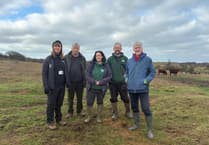NEW evidence has shown a continuing rise in mental health difficulties among children and young people in Wales, underlining the need for early intervention, prevention, and collaborative action across all sectors.
The largest increases have been seen in emotional difficulties such as anxiety and depression, with evidence showing that these trends began long before the COVID-19 pandemic.
The findings are set out in a new joint statement on Children and Young People’s Mental Health and Wellbeing, published by Public Health Wales in collaboration with experts from across the UK and young people from the Wolfson Centre for Young People’s Mental Health at Cardiff University.
The results show that rates of diagnosable mental health conditions among children and young people have doubled over the past two decades, from one in ten in 2004 to one in five in 2023.
It highlights the complex causes behind these increases, including family poverty, social inequality, academic pressure, parental mental health difficulties, and the influence of digital technology, while also emphasising the importance of community connection, trusted relationships, and opportunities for creativity and physical activity as protective factors that support mental health and wellbeing.
The Joint Statement on Children and Young People’s Mental Health and Wellbeing brings together views from leading experts and young people and a review of the latest data and evidence on patterns of mental health difficulties among children and young people in Wales, the UK and globally.
The findings also reinforce the need to focus on children’s wellbeing from the earliest years, so families get the right support and young people grow up in environments that protect their health and emotional resilience.
Emily van de Venter, Lead Consultant in Mental Wellbeing for Public Health Wales, said: “Although the level of need is concerning, I have lots of hope in our ability to improve outcomes for children and young people in Wales. The Mental Health and Wellbeing Strategy for Wales puts an important focus on improving timely access to mental health services and support as well as improving the social and emotional wellbeing of children and young people.
“We need to help children and young people to feel hopeful about the future, to feel connected to and accepted in their communities and to be able to access support as early as possible when they are struggling.”
Professor Stephan Collishaw, from the Wolfson Centre for Young People’s Mental Health at Cardiff University, said: “Evidence shows a concerning rise in mental health problems in young people. Family poverty, social inequality, lack of timely mental health support, and increased social and academic stressors all play a role.
“This is also reflected in the experiences of young people who helped create this joint statement. Improving young people’s mental wellbeing is not only a moral imperative but also represents a strategic investment in our collective future.
“When we nurture mental health, we unlock young people’s educational potential, strengthen long-term health, and enrich the social fabric of our communities.”
The Mental Health and Wellbeing Strategy for Wales 2025–2035 sets out a vision for a system that prioritises prevention and early intervention, tackles root causes of poor mental health, and ensures equity of access and outcomes for all.
Rocío Cifuentes MBE – Children’s Commissioner for Wales said, "As the Children’s Commissioner for Wales, I endorse this evidence-based statement, which also reflects themes heard through our engagement with children, young people and professionals.”Public Health Wales is working with Welsh Government, NHS partners and wider organisations to support delivery of the strategy, including:
- Developing a detailed report on the mental health and wellbeing needs of babies, children and young people.
- Supporting schools to implement Whole School Approaches to Emotional and Mental Wellbeing.
- Helping organisations and communities to understand and respond to trauma through the Trauma Informed Wales Framework.
- Supporting action to reduce child poverty and improve access to protective wellbeing activities such as arts and nature-based initiatives.
If you or someone you know is struggling with mental health difficulties, help and support are available:
NHS 111 (press 2) – for urgent access to a mental health professional. The service is available for people of all ages, 24 hours a day, seven days a week, in all areas of Wales.
CALL Mental Health Helpline for Wales – offers confidential emotional support and advice to individuals and families, 24 hours a day, 7 days a week. Freephone 0800 132 737 or text “help” to 81066. More information is available at www.callhelpline.org.uk



-cropped_cropped.jpeg?width=209&height=140&crop=209:145,smart&quality=75)

Comments
This article has no comments yet. Be the first to leave a comment.